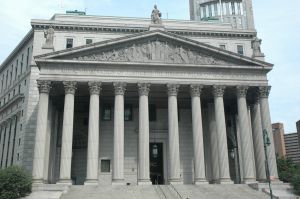 When a person dies without a Last Will and Testament he is deemed to have died intestate. In these cases, there are specific New York estate statutes and procedures which are applicable. The New York Probate Lawyer Blog has published many articles concerning intestate estates as well as topics such as probate, accountings, Surrogate’s Court and Article 81 Guardianships.
When a person dies without a Last Will and Testament he is deemed to have died intestate. In these cases, there are specific New York estate statutes and procedures which are applicable. The New York Probate Lawyer Blog has published many articles concerning intestate estates as well as topics such as probate, accountings, Surrogate’s Court and Article 81 Guardianships.
The primary statute which is to be looked at is Estates, Powers and Trusts Law Section 4-1.1 which is entitled “Descent and distribution of a decedent’s estate”. This statute which this Blog has discussed many times, provides the priority of a decedent’s next of kin to inherit the estate. For example, a spouse and children have priority before parents and siblings. The statute sets forth the priority all the way to more distant relatives such as cousins. Thus, in estates where there is no Last Will, the identities of distributees is a paramount issue. There are many cases where a person’s heirs are either unknown or cannot be located. There may be a need to hire a genealogist or investigator to obtain this information. When a decedent’s family tree is unclear or the closest relatives are distant, the Surrogate’s Court may require a Kinship Hearing to resolve these issues. Proof of kinship may be very difficult since birth, death, marriage and other records and information may be hard to locate particularly in foreign or out of state places.
Another very important statute is Surrogate’s Court Procedure Act Section 1001 which is entitled “Order of priority for granting letters of administration”. This statute provides for the persons who have the priority right to be appointed as the Administrator of the estate. When there is a Last Will, the document sets forth the named Executor so this statute is generally not applicable in probate.
One significant aspect of Administration cases is that when the closest relatives are cousins or when no one steps forward to seek appointment as Administrator, the local Public Administrator is appointed as the estate fiduciary. A Public Administrator is a local, usually county, government official whose task it is to handle estates in the above situations. The Public Administrator is entitled to be paid a fee from the estate assets. Also, this official will be represented by legal counsel who also is entitled to be paid legal fees from the assets.
In some cases which the Public Administrator handles, there may not be enough proof of kinship for the Court to make a determination as to whom the estate should be distributed to. When this happens, the estate funds are turned over to the government comptroller’s office. Family members can later bring another Surrogate’s Court proceeding to withdraw these funds when additional kinship information becomes available.
As can be seen, handling and administering a New York estate can be complicated. I have been representing estate executors, beneficiaries and administrators in estate and Surrogate’s Court matters for over 40 years. Do you have an estate question? Call me now for a free confidential review of your issue. We provide reasonable and flexible fee arrangements and personal representation.
New York Trusts and Estate Attorney Jules Martin Haas has helped many clients over the past 40 years resolve issues relating to guardianship and probate and estate settlement throughout New York City including the Bronx, Queens, Brooklyn, Manhattan, Nassau and Suffolk County. If you or someone you know has any questions regarding these matters, please contact me at (212) 355-2575 for an initial free consultation.
 New York Probate Lawyer Blog
New York Probate Lawyer Blog

